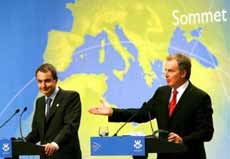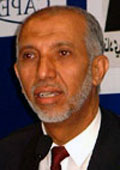|
Euromed Summit Agrees Terror Pact, No Definition
 |
|
"It's
as strong a statement as you can possibly have on the unified
determination to fight terrorism in all its forms," said
Blair. (Reuters)
|
BARCELONA,
Spain, November 28 (IslamOnline.net & News Agencies) – Europe and
its mostly Muslim southern neighbors clinched a last-minute agreement on
a code of conduct to fight terrorism on Monday, November 28, though the
two sides failed to agree a definition for terrorism.
"It's
as strong a statement as you can possibly have on the unified
determination to fight terrorism in all its forms," British Prime
Minister Tony Blair told a news conference, reported Reuters.
"Terrorism
can never be justified," he said.
"This
is a very important moment both for the European countries and for our
other colleagues round the table," said Blair, co-hosting the
summit with his Spanish counterpart Jose Luis Rodriguez Zapatero.
"Definitional
issues will run their course."
After
hours of wrangling, a final compromise omitted both the EU's insistence
that self-determination could not be used to justify terrorism and the
Arabs' demand to distinguish between terrorism and the right to resist
foreign occupation.
The
leaders were unable to agree on a planned common vision document because
of differences over what to say about the Israeli-Palestinian conflict.
Instead
the presidency issued a statement calling for a just, two-state
solution.
The
summit is to mark the 10th anniversary of the so-called
Euro-Mediterranean partnership, otherwise known as the Barcelona
Process, launched in the Spanish city in 1995.
The
Euromed partnership joins the 25-nation EU with Algeria, Egypt, Israel,
Jordan, Lebanon, Morocco, the Palestinian Authority, Syria, Tunisia and
Turkey.
Resistance
Discord
over the definition of terrorism marked the two-day gathering, which was
portrayed by the EU as a bid to revitalize a 10-year-old partnership
with its Mediterranean-rim partners.
Arab
partners wanted the EU to distinguish between terrorism and the right to
resist occupation, while the Europeans and Israel opposed any
qualification of terrorism.
"Success
in confronting terrorism on the regional or international levels is
contingent upon addressing its root causes and protecting the rights of
peoples under foreign occupation to resistance," Syrian Foreign
Minister Farouq Al-Shara told the summit.
Spain
- co-hosting the summit - has lobbied for a greater EU commitment to
North Africa.
Madrid
believes more prosperity in Africa will help stem the flow of illegal
migrants desperate to reach wealthy Europe and counter extremist beliefs
that feed terrorism.
Immigration
The
summit also agreed on a raft of initiatives to combat illegal
immigration, while fostering legal migration flows as a means of
allowing wealth to flow from north to south.
Zapatero
said the summiteers favored "regulated, ordered, well-managed
migration, and Barcelona has taken important steps to that end."
The
summit also agreed on a five-year work plan to cement relations between
the two regional groups.
European
Commission chief Jose Manuel Barroso said that Europe was "now
building a bridge to the south" having held firm during the Cold
War until the barriers between Western and Eastern Europe disappeared.
Money
for Reform
 |
|
"We
find it humiliating that the Europeans demand reforms from us in
exchange for a few euros," said Belkhadem.
|
Arab
delegations expressed frustration that terrorism and immigration bumped
economic development down the list of priorities.
"We
find it humiliating that the Europeans demand reforms from us in
exchange for a few euros," said Algerian minister of state
Abdelaziz Belkhadem.
Arab
analysts maintained that the summit should have done more to press for
development, although the meeting did see the creation of a 45 million
euro (52.6 million dollar) risk capital investment fund for
Maghreb-region firms, rising to a potential 100 million euros.
The
summit was clouded by the absence of eight Arab leaders.
European
Parliament head Josep Borrell said it was a "shame" that so
many of the partner countries' leaders had decided not to come to the
summit, instead sending lower-level delegations to Barcelona.
"Their
presence would have been very useful and would have presented a stronger
political commitment," he said, adding that "some absences
were justified, others less so."
Of
the Mediterranean-rim partner states, only Palestinian President Mahmoud
Abbas and Turkish Premier Recep Tayyip Erdogan led highest-level
delegations.
The
Barcelona summit was meant to be the first time that leaders of a group
that includes Israelis and Palestinians as well as the 25 EU countries
had met.
Previous
meetings of the Euro-Mediterranean group have been at foreign minister
level.
That
undermined the prestige of a meeting which EU leaders wanted to extend
cooperation across the Mediterranean to help combat terrorism and
illegal immigration.
|